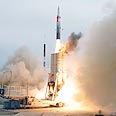
Israel's 'Arrow' missile
Prepare to face the missiles
Avi Schnurr urges incoming government to change direction, make missile defense a top priority
World War II, the Yom Kippur War, and the September 11 attacks all have something in common: Years later, people are still asking: “Why did we ignore all the warning signs?” The Second Lebanon War and the ongoing violence in Gaza are two such warning signs.
In recent years, our enemies have focused most of their efforts in preparing for a missile war. In fact, at this time, the largest arsenal of ballistic missiles in the world is aimed at Israel. When the new government gets to assess Israel’s strategic position and define new directions and policies, it will encounter the most terrifying security nightmare faced by Israel since 1948. Will it heed the warning signs and embark on a new path?
The historical picture is discouraging. Democratic states have a tendency to respond to new crises by ignoring them, preferring to wait for the post-disaster shock and pain after in order to unite the nation while offering a response and during the recovery. Regrettably, we do not have this privilege.
Today, Syria and Hizbullah possess thousands of long range guided missiles with heavy warheads that are capable of hitting the refineries in Haifa, razing the Azrieli Towers in Tel Aviv, and paralyzing Ben-Gurion Airport. We thoroughly control the Middle Eastern aerial space, yet not our own. Our enemies on the north are capable of lighting up the skies of Israel with rockets and missiles, and the moment they are fired our ability to intercept them would be very limited.
Indeed, Israel possesses the Arrow missile, a powerful anti-missile defense system designed to intercept long and medium range missiles. However, we still do not possess effective active protection against short range missiles and rockets. The absence of a comprehensive anti-missile program attests to a large gap in terms of our ability to address the growing threat, compared to where we should be.
Required changes not cosmetic
The required changes are not cosmetic, but rather, fundamental and broad shifts. We must make the response to the threat one of our top priorities. Should the new government succeed in doing so, it will set a new standard of leadership.There is a wide variety of issues that need to be dealt with in respect to protection against missiles. While we wait for interception means currently being developed for medium and short range missiles, we must equip ourselves with the most available and tested systems. Once we identify the suitable systems, we must demand that the manufacturers adopt them to Israel’s unique needs and configurations. This will supply us with essential capabilities in the near future and help us protect the population and prepare our security forces.
The installation of warning sensors and alarm systems, which have proven to be vital and life-saving, must continue. The development of a program of passive defense capabilities is also a vital need, in order to ensure that our key infrastructure components (electricity, phone, and water systems, etc.) will survive both a conventional and a non-conventional war.
The fact that after eight years and many military operations we are still unable to prevent the rocket attacks from Gaza constitutes a major warning sign. In the next war we shall have to contend with warheads weighing half a ton that will be fired at carefully selected targets. Therefore, it is essential that we start focusing on this threat.
Avi Schnurr is a physicist who examined America’s defense policy on behalf of the Pentagon, Congress, National Security Agency, National Academy of Sciences, and NATO. Toady he is the executive director of the Israel Missile Defense Association.










